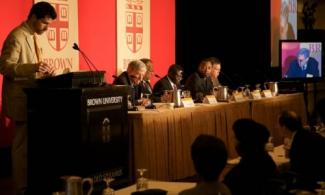
Nigeria’s Ambassador to the United States, Prof. Adebowale Adefuye today threatened to deal with Ambassador John Campbell, the former U.S. Ambassador to Nigeria. The outburst happened on the second day of the 2010 Achebe Colloquium at Brown University.
Nigeria’s Ambassador to the United States, Prof. Adebowale Adefuye today threatened to deal with Ambassador John Campbell, the former U.S. Ambassador to Nigeria. The outburst happened on the second day of the 2010 Achebe Colloquium at Brown University.
googletag.cmd.push(function() { googletag.display('content1'); });
Ambassador Adefuye was responding to the discussions on the Recovering of stolen Nigerian funds. “I will deal with him,” Ambassador Adefuye shouted. “With friends like him, Nigeria does not need any enemies. We shall confront him in the next section and by the time we finish with him, he will see that Nigeria is not on the brink.”
The panel comprised of Ambassadors Walter Carrington and John Campbell, EFCC Secretary, Emmanuel Akomaye, Omoyele Sowore of Saharareporters and Peter Lewis of John Hopkins University.
In his contribution, Omoyele Sowore of Saharareporters called Nigerian looters stupid because the ostentatious display of their loot easily gave them away. He expressed surprise that looters often bought state of the art cars that can not be driven on Nigerian roads because of their appalling conditions.
“The EFCC has become a very bad comedy club,” Mr. Sowore said as he mocked the anti-corruption agency’s quest to arrest former U.S. Vice President, Dick Cheney.
“The EFCC pretends once in a while to try people,” Sowore said, “If you find Dick Cheney, put him on a plane, the EFCC is looking for him.” He wondered why the EFCC was not dealing with looters in Nigeria but rather pursuing shadows abroad.
Referring to the recent incident in which the Presidency allegedly tried to bribe the Save Nigeria Group, he stated: “What is insulting to me is that they no longer bribe with our own currency but with the dollar,” he lamented.
Peter Lewis referring to statistics provided by the Global Financial Integrity estimated that Nigeria had lost over $218 billion due to looting by Nigerian officials since 1970. This amounted to the total earnings of Nigeria during the two decades, 1980s and 1990s,. He suggested that the U.S. Justice department had not been doing enough the way the British had been.
Anecdotal information indicate that Nigerian looters are quickly finding alternative places for their loot. “If people find out that the U.S. and Britain are no longer good places to put money they go somewhere else.”
Ambassador John Campbell mentioned that illicit assets from Nigeria contribute directly to international criminal activities which impact the U.S. national security. “It is manifestly bad for Nigeria and manifestly bad for the United States,” he said.
Ambassador Campbell noted that the Global Financial Integrity Group estimated that $854 billion U.S. dollars left Africa as looted funds in the last fifty years. “Africa gives back to the world at least twice of what it takes in,” he said.
Ambassador Carrington said that unless the EFCC go after everyone who is corrupt, the agency would not gain the confidence of the people.
“What I fear is likely going to be Nigeria’s fate unless it gets itself together is that Nigeria is not likely to implode but is likely to carry on in stagnation while other countries grow and over take it.” Who would have thought two decades ago, he questioned, that South Africa would so strongly outstrip Nigeria economically.
Mr. Emmanuel Akomaye defended the EFCC. He stated that there were impediments that were stopping the Agency from achieving its goals. He mentioned some challenges in the work of EFCC including poor international collaboration, weak enforcement mechanisms and laws as well as lack of political will on the part of governments. He also called for a national strategy to combat corruption and expedite the judicial processes.
“If you do not address the politics,” Akomaye said, “you cannot address an efficient asset recovery.”
He concluded by pleading that anti-corruption efforts should combine criminal and civil approaches as well as non conviction based asset recovery.
“Asset recovery should not be discussed as an emotional process,” Mr. Akomaye warned, “it is based on law.
googletag.cmd.push(function() { googletag.display('comments'); });
googletag.cmd.push(function() { googletag.display('content2'); });